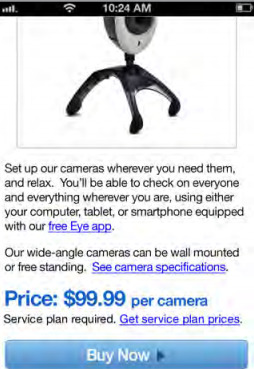FTC: Advertisers Can't Post Deceptive Tweets/mobile Ads
The Federal Trade Commission is setting some new, and much needed, guidelines for advertisers. The FTC has updated its guidelines, which were initially released in the year 2000, to include new ad marketing platforms. The FTC states that no matter what medium is used to see the ads, whether its a TV, radio, newspaper, computer, tablet, or a mobile phone, the ads must include full disclosure on the products being marketed.
The picture below displays the wrong way to present a mobile ad. While the advertisement states the pricing of the wireless security system, it doesn't show that the system also requires a monthly service plan to use. This is misleading to customers who may not have purchased the product if they had known that there would be a monthly service fee added on.

Below is the correct way to display the ad. All of the required information is all on one screen, including the requirement of a service plan for the monitoring system. The FTC wants sites to optimize their website content for mobile devices, so that all disclosures are visible within one screen. It believes that mobile users may miss important disclosures by having to zoom in on web pages.

Below is a tweet advertisement. The FTC is requiring that tweets have to disclose all of the required information in the 140 characters allotted. Companies can no longer only post certain information, and then redirect its users to a link. The advertisements can't be split across multiple tweets either. The companies have to make it clear that the tweet is an advertisement, and they have to disclose the general results that consumers can see when using its products.

The full details on how to optimize advertisements for mobile devices and tweets are all disclosed in this FTC file. Companies that violate any of the updated rules will receive penalties for "engaging in unfair or deceptive practices, in violation of the FTC Act." The FTC is cracking down on deceitful advertisements and protecting consumers and their money. The updated guidelines were unanimously approved by the commission board.
[via PC Mag]
